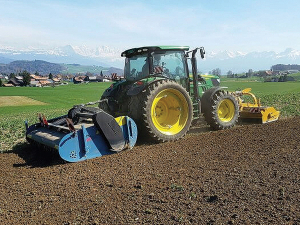While powered cultivation typically centres around rotary hoes or power harrows, each has its pros and cons.
The former is prone to creating a ‘smeared’ pan, while the latter format can struggle to maintain working depth as blades or tines wear.
Netherlands-based company Imants was founded in 1885 building basic farm machinery and ploughs. In 1960, the company was approached by a local horticulturist who had a concept for building a spading machine.
By the late 1970s and into the 1980s, spading machines accounted for around two thirds of the company’s turnover. Today it offers a vast range of models produced by its workforce of around 55 people.
With more than 60 years of experience designing and manufacturing spading machines, the company understands digging is much more than just turning soil.
Spading mixes organic material with the living topsoil by working crop residues and green manure into the soil, so they can be converted into nutrients and a seedbed ready for planting.
Imants says it can offer a solution for any tillage requirement, be it deep or shallow, active or passive, intensive or extensive, mixing or non-mixing.
The rotating movement of the spade ensures optimal mixing and, because the spade blades take soil sections of 25-30cm from the underlying soil layer, a pan is not created. This action also means that water nearer the surface can penetrate deeper soil strata and replenish the ground water.
The looser soil structure that remains after spading also ensures air can move through the profile and roots can also travel deeper looking for nutrients.
During spading, the subsoil is mixed, but not completely turned over. This preserves most of the soil temperature, reducing the time it takes for the soil to warm up, resulting in faster germination, while the deeper soil layers are given time enough to warm as the plants grow. The range of spader sizes is quite comprehensive from 1.2m to 4.5m machines and from depths of 15cm to 135cm, with horsepower ratings up to 300hp.
The spaders can operate directly into pasture, sprayed out ground or previously cropped land. A broad product range sees machines designed for sandy/loam soils or dry/wet clay situations.
Attachments can be added to fine tune finishes, such as rear rollers, pre-rippers, fumigation units and airseeders.
More recently, Imants Spaders has been helping deal with the devastating effects created by Cyclone Gabrielle, that in many cases left large silt deposits on cropping land and orchards. The action of the machines has proven to be very successful in bringing more open structured soil upwards and mixing the silt deposits throughout the general profile.
www.matamataag.co.nz


















